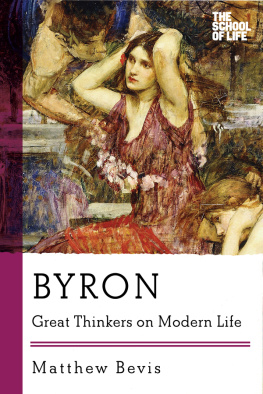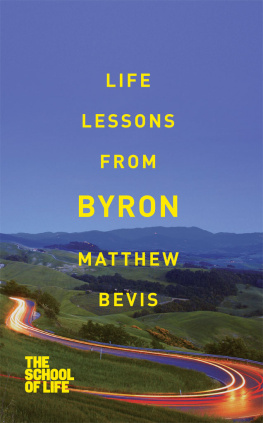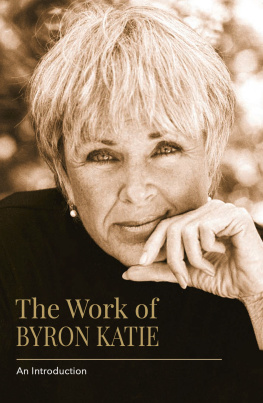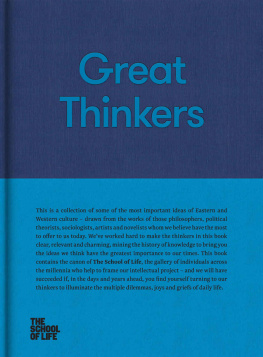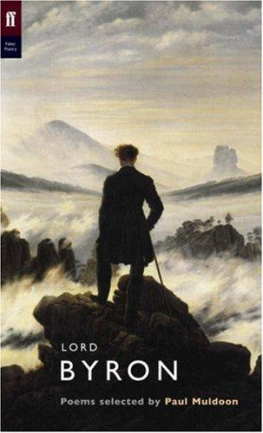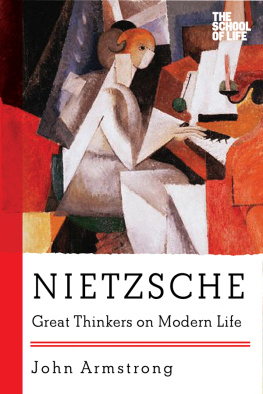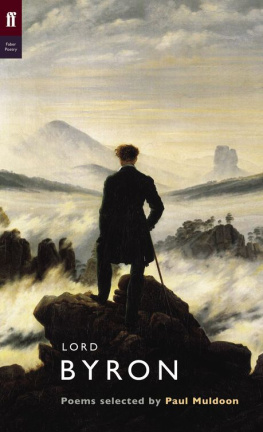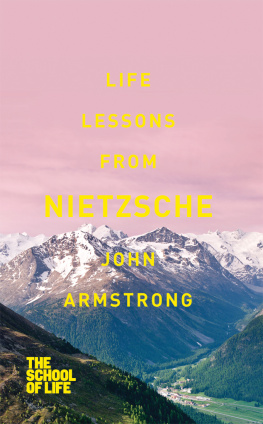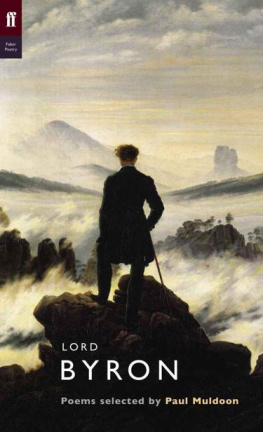
THE SCHOOL OF LIFE is dedicated to exploring lifes big questions: How can we fulfill our potential? Can work be inspiring? Why does community matter? Can relationships last a lifetime? We dont have all the answers, but we will direct you towards a variety of useful ideasfrom philosophy to literature, psychology to the visual artsthat are guaranteed to stimulate, provoke, nourish and console.

THESCHOOLOFLIFE.COM
BYRON
Great Thinkers on Modern Life
Matthew Bevis

It was such pleasure to behold him, such
Enlargement of existence to partake
Nature with him
(Byron, Don Juan , 181924)
CONTENTS
Introduction
Going to School with Byron
INTRODUCTION:
GOING TO SCHOOL WITH BYRON
Where did you learn all these secrets? I should like to go to school there.
(Shelley, letter to Byron, 26 May 1820)
Shelley wrote this letter having just finished the first part of Byrons comic masterpiece, Don Juan . Byron obtained many of the secrets from what some might term the school of life. This book is about what the poet learned there and about what might be learned from him.
It should be conceded at the start that Byron is not convinced that you can get life lessons from books. Who was ever altered by a poem? he said. Reading or non-reading a book will never keep down a single petticoat. More generally, he tends to distrust those who are keen to give advice, or those who claim to have the moral high ground (creatures he refers to as bigots of virtue). After offering his own pearl of wisdom to a correspondent, the poet admitted that this is, like most good advice, impracticable. Elsewhere he dwells on the example of Prometheus, the Titan who was punished for stealing fire from the gods:
He teaches us the lesson taught so long,
So oft, so vainly learn to do no wrong!
( The Age of Bronze , 1823)
Even I, Byron admits, am just skilled to know the right and choose the wrong. So a lesson, it would seem, is something that people cant or wont learn. But the poet doesnt always lament this state of affairs, and one of his finest qualities is his commitment to being incorrigible:
Oh Pleasure! youre indeed a pleasant thing,
Although one must be damned for you, no doubt;
I make a resolution every spring
Of reformation, ere the year run out,
But, somehow, this my vestal vow takes wing,
Yet still, I trust, it may be kept throughout:
Im very sorry, very much ashamed,
And mean, next winter, to be quite reclaimed.
( Don Juan , 181924)
Not that ashamed, we suspect. Besides, next winter is a long way off. What Byron really reclaims is a relishing of present experience. As he puts it elsewhere, he wants to learn experience, which is not necessarily the same thing as learning from it.
Having said all this, Byron does assert in Don Juan that his poem is a great moral lesson, and he noted to a friend that it is my respect for morals that makes me so indignant against its vile substitute: cant. Hes often insistent that poetry should try to make man better and wiser, and he praised his literary hero, Alexander Pope, for writing Ethical poetry, in my mind the highest of all poetry. Popes verse, he said, was the Book of Life, and Byron was an ardent defender of the idea that books should take their bearings from everyday experience: Almost all of Don Juan is real life either my own or from people I knew. Despite his scepticism about what writing could achieve, he explained that he wrote as a means to obtain influence over mens minds which is a power in itself and in its consequences. In the chapters that follow, Ill be exploring some of the ways in which that power might be conceived and put to use.
To go to school with Byron is not to go to Sunday school. In Don Juan , the prim and proper Donna Inez sets up a Sunday school
For naughty children, who would rather play
(Like truant rogues) the devil, or the fool.
( Don Juan , 181924)
The poet, though, is enamoured of truant rogues and of the special ways in which they learn things. Later in the poem, Juan and Haidee fall for each other as she tries to teach him her language. This is how life lessons are learned in Byrons universe:
And now, by dint of fingers and of eyes,
And words repeated after her, he took
A lesson in her tongue; but by surmise,
No doubt, less of her language than her Look:
As he who studies fervently the skies
Turns oftener to the stars than to his book,
Thus Juan learned his alpha beta better
From Haidees glance than any graven letter
Tis pleasing to be schooled in a strange tongue
By female lips and eyes that is, I mean,
When both the teacher and the taught are young,
As was the case, at least, where I have been;
They smile so when ones right, and when ones wrong
They smile still more, and then there intervene
Pressure of hands, perhaps even a chaste kiss;
I learned the little that I know by this.
( Don Juan , 181924)
Its not so much what such charismatic, seductive teachers communicate, but how they do it (a glance, a look, a smile). This is Byrons kind of teaching (he was always averse to the drilled dull lesson, forced down word by word). We learn his lessons not by rote, but rather take them by surmise. And in Byronic schooling, the teacher and the taught are partners in crime, part of a double act in which its not entirely clear who has the upper hand. Perhaps this book might be better called Life Lessons in Byron , rather than from Byron . For this poet, a lesson isnt something that is handed down. Its more like a language you can learn, a mode of being and speaking in the world: he took / A lesson in her tongue. To speak Byron is to put yourself to school in unpredictable ways. A new language, he suggests, can provide a new repertoire for living.
*
Singular most curious nauseating, perhaps, but how quite inexpressibly significant.
(Henry James, on reading Byrons private papers)
Everyone thinks they know Byron. And they know that to know him is a kind of risk. Lady Caroline Lambs description hes mad, bad, and dangerous to know has stuck. Hes the Romantic wild-child who cant be tamed. I was born for opposition, he proclaimed. But on other occasions he was less strident: If you hear ill of me, he wrote to one correspondent, it is probably not untrue though perhaps exaggerated. There is a lot that is not untrue about Byron. He was famous for being infamous, and tales of sodomy and scandal, incest and intrigue, were never very far away. Here was a poet who was intent on being more than a poet. I do not draw well with Literary men, he confessed. I never know what to say to them after I have praised their last publication. In Beppo he added: One hates an author thats all author . And so this author had many other lives to live: the parliamentary speaker, the Regency rake, the European voyager, the defender of Greek liberty, and so on. Wherever people looked, the man was up to something. T. S. Eliot was right: Byron has the cardinal virtue of never being dull.
He was born in 1788, a year before the French Revolution broke out. My whole life was a contest, he said, and early on it looked as though political contests would claim his attention. He took his seat in the House of Lords in 1809, making speeches in favour of Catholic Emancipation and other liberal causes. After a Grand Tour of the Iberian peninsula and the Turkish dominions in the Levant, he published the first part of Childe Harolds Pilgrimage in 1812. It was an overnight success: I awoke one morning and found myself famous. Later, he boasted:
Next page
